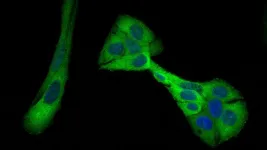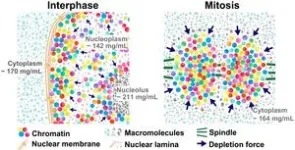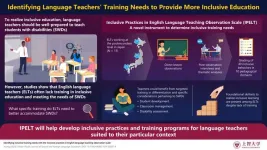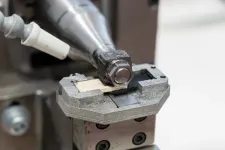(Press-News.org) Cancer cells have voracious appetites. And there are certain nutrients they can’t live without. Scientists have long hoped they might stop tumors in their tracks by cutting off an essential part of cancer cells’ diet. But these cells are crafty and often find a new way to get what they need. How? By reprogramming their metabolism and switching to backup food supplies.
Now, Cold Spring Harbor Laboratory (CSHL) Assistant Professor Michael Lukey has found a way to deprive cancer cells of both a vital nutrient and their backup supply. In lab experiments with breast cancer cells, patient-derived tissue models, and mice, this strategy killed breast cancer cells and shrank tumors.
How does this work? Let’s go back to cancer metabolism. Aggressive cancer cells avidly consume an amino acid called glutamine. They use this vital nutrient to generate the energy and materials needed to grow and replicate.
Previous studies have shown that starving cancer cells of glutamine or preventing its conversion into metabolites can stop the cells’ growth in the lab. However, in recent clinical trials, breast cancer patients didn’t benefit from a drug taking this approach. This suggests that breast cancer cells can adapt and find a way to live without glutamine.
Lukey and postdoc Yijian Qiu saw the same thing in their lab. They noticed that breast cancer cells adapt to glutamine starvation by switching on a pathway that generates a critical metabolite called alpha-ketoglutarate, normally derived from glutamine. This enables cancer cells to continue producing the energy and building materials they would otherwise get from glutamine. It was a lightbulb moment for Lukey’s lab.
“That made us think, could we exploit this for cancer therapy?” Lukey recalls. “Could we target glutamine metabolism? We know the cells adapt to that. So, could we simultaneously target their adaptive response by inhibiting the pathway?”
The approach was successful, killing breast cancer cells in lab dishes and effectively treating tumors in mice. Lukey’s team saw tumors stop growing and even shrink with the combination treatment. The animals remained healthy.
Inhibitors of both metabolic pathways are now under further investigation. Lukey notes that these pathways might be especially important for breast cancer metastasis to different tissues, including some that are very difficult to treat. “Brain metastases in particular lack any effective therapies,” Lukey explains.
Lukey hopes his lab’s combination therapy could ultimately improve the efficacy of glutamine metabolism inhibitors in the clinic. This could mean effective new treatments that target cancer’s metabolic addictions.
END
How breast cancer goes hungry
2024-08-28
ELSE PRESS RELEASES FROM THIS DATE:
Are English teachers in Japan ready to teach students with disabilities?
2024-08-28
Access to education is recognized as one of the pillars of sustainability; it is certainly a necessary foundation if we are to build a better world for ourselves and future generations. However, education needs to be not only accessible, but also inclusive. That is, it should extend to people with all kinds of disabilities and suit their particular needs.
According to a recent report by the World Health Organization, it is estimated that a striking 16% of the world’s population lives with some form of disability. Considering there are about 1.5 billion English language teachers (ELTs) worldwide, there is a great need for adequately trained ELTs that can teach students with ...
Aging population: Public willingness to pay for healthcare hinges on perceived benefits and risks
2024-08-28
Healthcare is undoubtedly crucial for everyone. As individuals age, the risk for health issues and related expenses increases. Consequently, many countries have universal healthcare systems, primarily funded through tax and insurance, to ensure access to essential healthcare services. However, this system is under a heavy fiscal burden since the aging population has increased manyfold, owing to decreasing fertility rates and increasing life span. To sustain the system, governments must face the herculean task of persuading citizens to contribute more to health insurance.
In a recent study, a research team consisting of Associate ...
UTSA, Tec de Monterrey welcome inaugural students to binational cyber program
2024-08-28
SAN ANTONIO, TEXAS — One master’s program. Two universities. Two countries. Two degrees. Students from UTSA and Tecnológico de Monterrey (Tec de Monterrey) in Mexico are swapping campuses, as the two universities jointly launch a unique new degree program this fall.
The collaborative program offers students the distinctive opportunity to take high-quality courses at both institutions and earn two degrees: a Master of Science in Information Technology with a concentration in cybersecurity from UTSA and a Master in Cybersecurity from Tec de Monterrey.
The program will enable students to advance their cybersecurity ...
A healthy lifestyle may counteract diabetes-associated brain ageing
2024-08-28
Type 2 diabetes and prediabetes are associated with accelerated brain ageing, according to a new study from Karolinska Institutet in Sweden published in the journal Diabetes Care. The good news is that this may be counteracted by a healthy lifestyle.
Type 2 diabetes is a known risk factor for dementia, but it is unclear how diabetes and its early stages, known as prediabetes, affect brain ageing in people without dementia. Now, a comprehensive brain imaging study shows that both diabetes and prediabetes can be linked to accelerated brain ageing.
The study included more than 31,000 people between 40 and ...
Epigenetics blood markers can help understand dementia risk
2024-08-28
New research suggests that epigenetic markers in the blood could be useful for understanding dementia risk.
Two linked papers from the University of Exeter and Maastricht University have together progressed research to show the potential for DNA methylation, an epigenetic marker, in understanding how genetics and lifestyle factors influence dementia risk.
DNA methylation is a chemical tag added to DNA, which can turn genes on and off. Genetic and lifestyle factors can alter the levels of the DNA methylation tag on genes, with some of these factors already known to increase the risk of developing dementia. By assessing DNA methylation this can help scientists ...
In-person contact linked with lower levels of loneliness in older adults
2024-08-28
EMBARGO UNTIL 6 A.M. EST, WEDNESDAY AUG. 28, 2024.
In-person contact helps lead to lower levels of loneliness in older people, but other ways of staying in touch, such as phoning, emailing or texting, are not as effective in lowering loneliness, a team of researchers at The University of Texas at Austin and the University of Michigan have found.
The findings, out today in the The Journals of Gerontology: Series B Psychological Science, have implications for the health and well-being of many older people.
“We were interested to see how older adults react ...
Alternatives in car and aircraft construction: New joining and additive manufacturing processes allow adhesive-free joining of wood and metal
2024-08-28
The renewable raw material wood is climate-neutral and at the same time light and strong, making it fundamentally attractive for use in vehicle manufacturing. One challenge to date has been joining the wood and the other materials in the vehicle, such as metals and polymer composites, in a robust way. The research team led by Sergio Amancio from the Institute of Materials Science, Joining and Forming of Graz University of Technology (TU Graz) - Gean Marcatto, Awais Awan, Willian Carvalho and Stefan Herbst - has now successfully tested two techniques by which extremely strong joints can be achieved without using adhesives or screws. ...
Study shows robotic arm can be used to perform remote echocardiograms
2024-08-28
London, United Kingdom – 28 August 2024: New research presented at this year’s ESC Congress 2024 in London, UK (30 Aug – 2 Sept) shows that performing echocardiograms remotely using a 5G cellular network has similar accuracy to those performed in person by cardiologists.
“Comprehensive echocardiographic exam with a 5G cellular network and robotic arm-based remote system is feasible with relatively good diagnostic accuracy,” said study author Dr Yu Liu, Zhongshan Hospital, Shanghai, China.
Echocardiography is the test-of-choice for the ...
Recent recreational drug use triples risk of repeat serious cardiovascular event
2024-08-28
London, United Kingdom – 28 August 2024: New research presented at this year’s ESC Congress 2024 in London, UK (30 Aug – 2 Sept) shows that, among patients admitted to the intensive cardiac care unit (ICCU), those with a recent history of recreational drug use are three times more likely than those with no history to experience a repeat serious cardiovascular event within one year.
“Among patients admitted to the intensive cardiac care unit (ICCU), systematic screening for recreational drugs evidenced a significant prevalence ...
Bats are surviving and thriving on nothing but sugar
2024-08-28
KANSAS CITY, MO—August 28, 2024—Humans must regulate blood sugar concentrations to stay healthy and to fuel our cells. Too little or too much can cause serious health complications, and high blood sugar is a hallmark of the metabolic condition, diabetes. New research from the Stowers Institute for Medical Research may enable potential solutions to metabolic disease by turning to evolution and to bats.
Recently published in Nature Ecology and Evolution on August 28, 2024, the study led by co-first authors Postdoctoral Research Associate Jasmin Camacho, Ph.D., and former Stowers researcher Andrea Bernal-Rivera from the lab of Stowers ...








